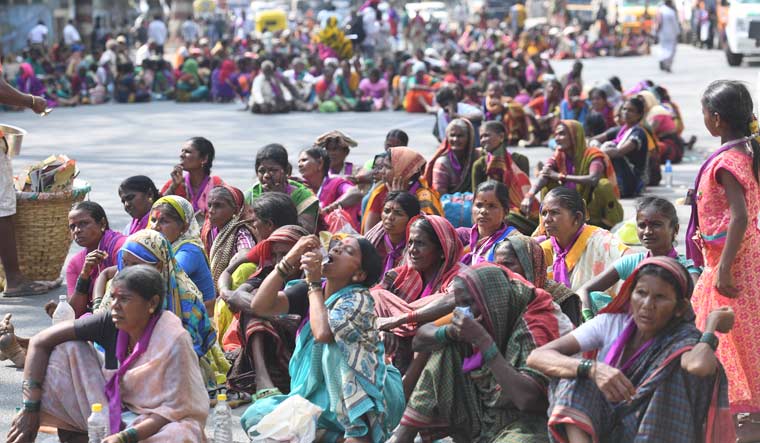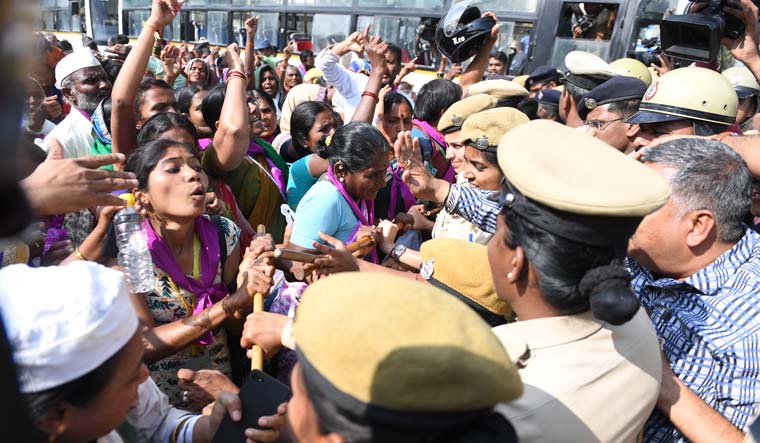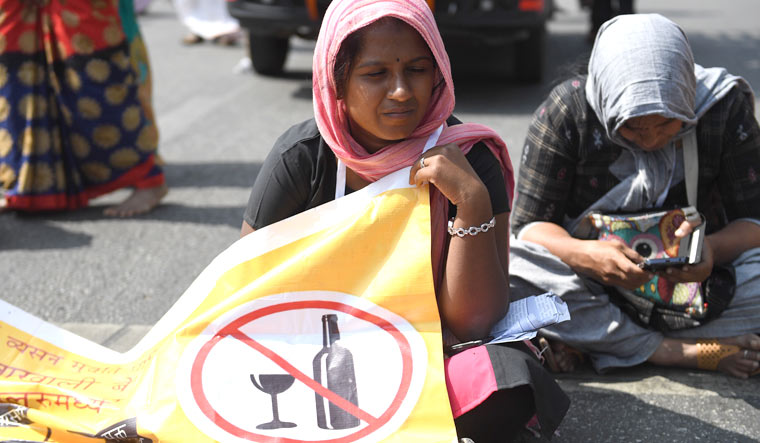"Saraayi beda shikshana beku" (We want no liquor, but education), shouted the women, as they passed through the heart of Bengaluru in a long procession.
Nearly 4,000 women entered the state capital on Wednesday, after walking for 11 days, covering 210km. The women from 19 districts from north Karnataka launched the "padayatra" from Chitradurga on January 19, demanding a total ban on production, sale and consumption of liquor in the state.
Alcoholism has shattered their homes, stolen childhoods, pushed the rural households into poverty and suffering, said the women.
The protesters who converged at Malleswaram grounds, eagerly set out on the Bengaluru streets, bringing the city's traffic to a grinding halt. But their plans to picket the Vidhana Soudha were thwarted after the police stopped them near Freedom Park and barricaded the street leading to the secretariat.
Even after waiting for five hours, Chief Minister H.D. Kumaraswamy refused to meet the protesters, and instead sent two envoys—Cooperation Minister Bandeppa Kashempur, followed by a senior officer from the CMO. The deadlock continues as the representatives of protesters, who finally agreed to meet the chief minister at Vidhana Soudha, came back empty handed, without any assurance.
The women are in no mood to back out this time and want a written assurance for a total ban. The demand for total prohibition in the state is not new.
"We will not vote for any party in the Lok Sabha polls. Two years back too, we held a 71-day protest in Raichur. But the government did not take us seriously, " said Mokshamma from Bagalkot.
It has been an arduous journey for these women, who have survived on sparse meals, taken shelter in open grounds, braving the hot sun during the day and chilly winter nights. They have had to forego their daily wages too.
 Women from across Karnataka have walked into Bengaluru to demand prohibition on alcohol in the state. Scenes from the Sheshadri Road near Vidhana Soudha | Bhanu Prakash Chandra
Women from across Karnataka have walked into Bengaluru to demand prohibition on alcohol in the state. Scenes from the Sheshadri Road near Vidhana Soudha | Bhanu Prakash Chandra
"It is a question of our lives and future of our children. We are ready to sacrifice our life if need be," said Eeramma, a widow.
"Of my eight sons, only two don't drink. The sons get drunk and beat me. Nobody can question them," cried the octogenarian.
Along the protest march, the women have forced shut many attack shops, tried to enlighten the women and reprimand the arrack shop owners. In one such meeting, the women came across Ambika (20), a battered wife and rescued her from her abusive drunkard husband at Dobbespet. "I am an orphan and my neighbours got me married to a drunkard. Many girls like me are suffering due to alcoholic husbands. Women lose husbands and young sons to alcohol. I have decided to dedicate the rest of my life for this cause," Ambika said.
Umakka (58), has come all the way from Sogi village in Ballari. "My husband passed away seven years back due to drinking problem. I took care of my five daughters and a son by working as a daily wager. Now, my son-in-law and one of my grandsons are drunkards. My 16-year-old grandson became an alcoholic after we sent him to a hostel in Hospet. I want the government to save the poor people like us by banning liquor," she said.
Raghavendra, member of Grameena Koolikarmikara Sanghatane in Raichur, said his organisation launched the liquor prohibition movement after some women approached them seeking help to reform their drunkard husbands. "Every village has a licensed liquor shop which also sells illegally in small grocery stores, too. Earlier, there were cheap pouches but now they sell expensive whisky and beer, too. The men end up spending their entire day's earning. The women are running the households by working as daily wagers. They work under NREGA. But their earnings are also taken away by their husbands or grown up sons who are chronic alcoholics," he said, adding that children are running the arrack shops.
Geeta Maruti Patil (60) from Belagavi lost her husband and elder son to alcohol. She lives with her younger son, who is a daily wager.
"Children in my village, as young as 12 years, get addicted to alcohol and they stop going to school. Women have to work as daily wagers as the men in the household get addicted and spend all their earnings on alcohol," Geeta lamented.
 Women from across Karnataka have walked into Bengaluru to demand prohibition on alcohol in the state. Scenes from the Sheshadri Road near Vidhana Soudha | Bhanu Prakash Chandra
Women from across Karnataka have walked into Bengaluru to demand prohibition on alcohol in the state. Scenes from the Sheshadri Road near Vidhana Soudha | Bhanu Prakash Chandra
Poonam (30) has joined the movement after she lost her younger sister Rekha and her nephew Chetan (3) to alcohol. "My sister's husband is a drunkard and he used to beat her. One day he killed her and his own son and dumped their body in a well. The culprit escaped punishment. I want the government to save women from this cruelty and domestic violence," said Poonam, who hails from Khanapur in Belagavi.
January 30 was the day Mahatma Gandhi was martyred. The women say it is the right time to remind the government that prohibition is the only way to save the rural poor. The movement has garnered support from Bengaluru activists, intellectuals and artistes, too.
"The government cannot shirk its responsibilities. Parties that will make prohibition part of their manifesto will get our votes. Does the government need this liquor money to run the state," asked Prasanna Heggodu.
Said anti-corruption activist Ravi Krishna Reddy, "When places like Bidar and Gujarat have prohibition, why not Karnataka? Our state's budget outlay is Rs 2.20 lakh crore and the excise revenue is Rs 17,000 crore which is less than 10 per cent. Can't the government forego this money? If the government wants to ban liquor, they can start phasing it out from today. Drinking is a menace and serious social problem. The government should tap other sources of revenue than destroy the life and livelihood of the poor."
Actor Arundhati Nag cited the example of Bihar. "In the last two years, law and order situation in Bihar has improved. Prohibition has reduced crime and women feel safer, too."



